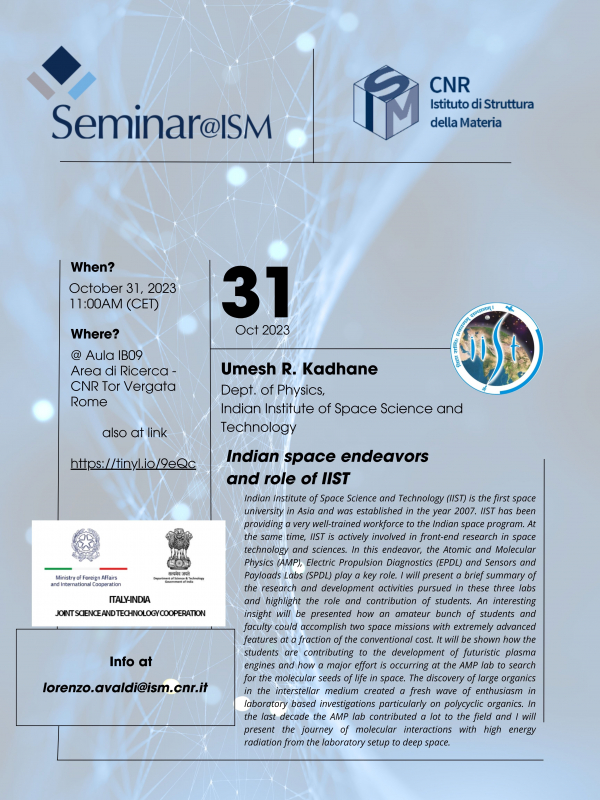The Indian Institute of Space Science and Technology (IIST) is the first space university in Asia and was established in the year 2007. IIST has been providing a very well-trained workforce to the Indian space program. At the same time, IIST is actively involved in front-end research in space technology and sciences. In this endeavor, the Atomic and Molecular Physics (AMP), Electric Propulsion Diagnostics (EPDL) and Sensors and Payloads Labs (SPDL) play a key role. Within the framework the Italy-India Joint Science and Technology Cooperation program supported by MAECI, Prof. Umesh R. Kadhane of the Physics Department of IIST will present a brief summary of the research and development activities pursued in these three labs and highlight the role and contribution of students. An interesting insight will be presented how an amateur bunch of students and faculty could accomplish two space missions with extremely advanced features at a fraction of the conventional cost. It will be shown how the students are contributing to the development of futur plasma engines and how a major effort is occurring at the AMP lab to search for the molecular seeds of life in space. The discovery of large organics in the interstellar medium created a fresh wave of enthusiasm in laboratory based investigations particularly on polycyclic organics. In the last decade the AMP lab contributed a lot to the field and Prof. Kadhane will present the journey of molecular interactions with high energy radiation from the laboratory setup to deep space.
Thursday, 26 October 2023 11:34
Seminar - Indian space endeavors and role of IIST
31st October, 11:00am (CET) - CNR Area della Ricerca di Tor Vergata - Aula IB09 - also - https://tinyl.io/9eQc
The Indian Institute of Space Science and Technology (IIST) is the first space University in Asia, established in 2007. IIST provides very well-trained workforce to the Indian space program and is actively involved in front-end research in space technology and science, playing a key role in Atomic and Molecular Physics (AMP), Electric Propulsion Diagnostics (EPDL) and Sensors and Payloads Labs (SPDL). Prof. U.R. Kadhane from the Dept. of Physics of IIST, will present a brief summary of the activities pursued in these three labs.
Published in
Various


 English (UK)
English (UK)  Italiano (Italia)
Italiano (Italia)